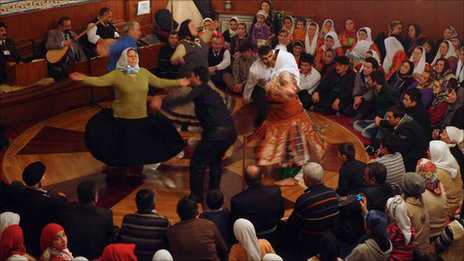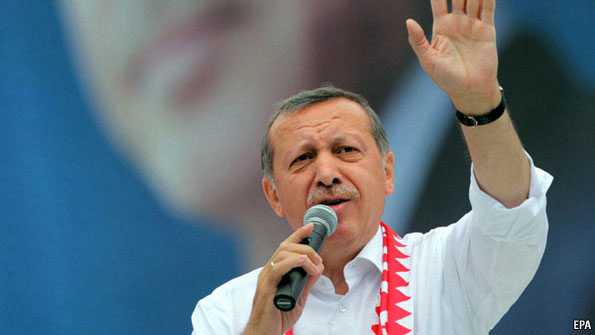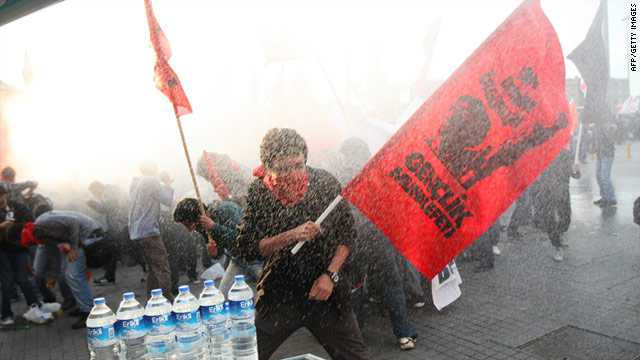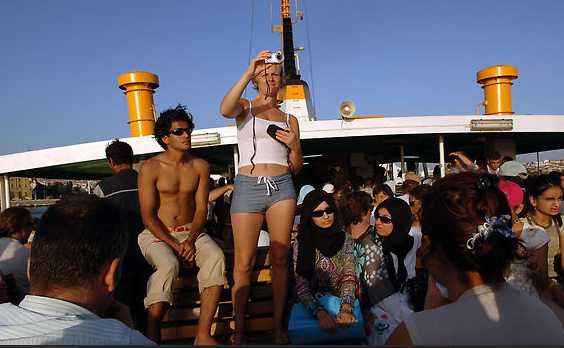By Jonathan Head BBC News, Istanbul
 Dance forms an important part of Alevi religious services
Dance forms an important part of Alevi religious servicesRelated Stories
- Turkey country profile
On 12 June, the Justice and Development Party (AKP), which has governed Turkey for the past eight years, will be seeking a third election victory.
Prime Minister Recep Tayyip Erdogan has ambitions to introduce far-reaching constitutional change and to do that he needs a larger, two-thirds majority of seats in the next parliament.
So the AKP needs to win new supporters. In particular, Mr Erdogan has tried to reach out to Turkey’s minorities. This is also an important requirement for Turkey’s EU membership bid.
One of the largest of these is the Alevi sect, a community whose beliefs combine elements of Shia Islam and pre-Islamic folk customs.
No-one knows how many Alevis there are, because no official census has ever been authorised. Unofficial estimates put their numbers at between 10% and 30% of the population. They include ethnic Turks and Kurds.
Centuries of oppression
Every Thursday, at community centres across Turkey called cemevi, Alevis gather to hold their unique religious services. Although officially defined as Muslims, Alevi prayer sessions are unorthodox.
“Start Quote

We expected to get equal rights but that didn’t happen”
End Quote Kamil Aykanat Head of the Okmeydani Alevi community in Istanbul
Men and women pray together, in a circle, the women wearing colourful headscarves – although outside the cemevi, Alevi woman are usually uncovered.
The service is led by a community elder, known as a dede, and musicians perform on traditional instruments, like the seven-string saz, or lute.
Groups of men and women come forward to dance. They whirl around in a circle at increasing speed, the men stamping their feet, the women spinning, their arms outstretched, as if in a trance.
Alevis do not pray in mosques, do not face Mecca, nor do they observe the fast during Ramadan, or the ban on drinking alcohol.
So for much of Turkey’s history they have been viewed as heretics by the Sunni Muslim majority. In the past, they were often persecuted. In the 16th Century, huge numbers were killed at the orders of the Ottoman Sultan Selim the Grim.
“Throughout the history of the Ottoman Empire we suffered from repression and massacres,” says Kamil Aykanat, who heads the Okmeydani Alevi community in Istanbul.
“When the new Turkish republic was established in 1923, we expected to get equal rights -but that didn’t happen.”
The new republic was avowedly secular. Founding father Kemal Ataturk saw the influence of Sunni imams as a barrier to progress.
But it also promoted the idea of a homogenous Turkish nation led by a powerful state. Resistance to this uniformity was ruthlessly crushed.
Thousands more Alevis were killed during an uprising in 1937-8, and although overt persecution has ended, there are still many Alevi grievances.
Erdogan’s ‘opening’
 Alevi people say their religion is neglected in schools
Alevi people say their religion is neglected in schoolsAfter his last election win in 2007, Mr Erdogan launched what he called his “Alevi opening”.
He commissioned a series of workshops led by the minister for religion to discuss Alevi demands for official recognition of their faith. They have been running for about a year, but have made little progress.
“These workshops are geared towards the election,” said Izzettin Dogan, chairman of the Cemevi Association.
“They are only to satisfy international opinion.”
Dursun Onal showed me the official textbook his son uses in the religious education classes which are compulsory in all Turkish schools.
Mostly it talks about Sunni Islam, with instructions on how to pray, fast, and make the pilgrimage to Mecca – with occasional references to Christianity and Judaism.
“You see, there is nothing about our beliefs in this book – from A to Z, nothing. This is a kind of torture for us.”
Alevis want these compulsory classes to stop. Some Alevis have gone to court – both in Turkey and to the European Court of Human Rights in Strasbourg – and won their demands that their children be exempted from these classes, but the verdicts have not been implemented by the Turkish department of education.
Sunni resistance
That has not stopped Mr Erdogan from saying his party is the only one trying to do something about the status of Alevis – but the AKP is in a difficult position on Alevis, because of the conservative Sunni beliefs of its supporters.
“We should remember that many of the Sunni religious people support the AKP,” says Nilufer Narli, a sociologist at Bahcesehir University in Istanbul.
“The AKP does want to introduce changes in the school curriculum and include Alevi teaching, but some Sunni religious people resist this and they haven’t reached a consensus.”
There is even stronger resistance to giving official recognition of cemevi as places of worship. This matters to Alevis, because they miss out on the state funding that goes to Turkey’s 85,000 mosques.
Faith in Turkey is tightly regulated by the powerful state directorate of religious affairs, and its head, Mehmet Gormus, says it is not possible to give cemevi the same status as mosques.
“In Islam, no institution or person can speak on behalf of God. We don’t have the authority to designate this or that place as a house of worship. It is the Koran and teachings of our Prophet [Muhammad], which tell us what to practice, and where.”
The result of this stalemate is that most Alevis are likely to give their votes to the secular CHP.
Ties between the Alevis and the CHP go back a long way and the party’s leader, Kemal Kilicdaroglu, is Alevi – though he rarely mentions it.
Mr Erdogan will have to seek his stronger mandate elsewhere, probably among supporters of hard-line nationalist parties.
“The current government is trying to be tolerant,” says Aykan Erdemir, one of Turkey’s foremost experts on Alevism and now a CHP candidate.
“The problem is it is a mistaken goal. What we need in this new millennium is not greater tolerance, but recognition, acceptance of equal citizenship, acceptance of fundamental rights and freedoms.”





